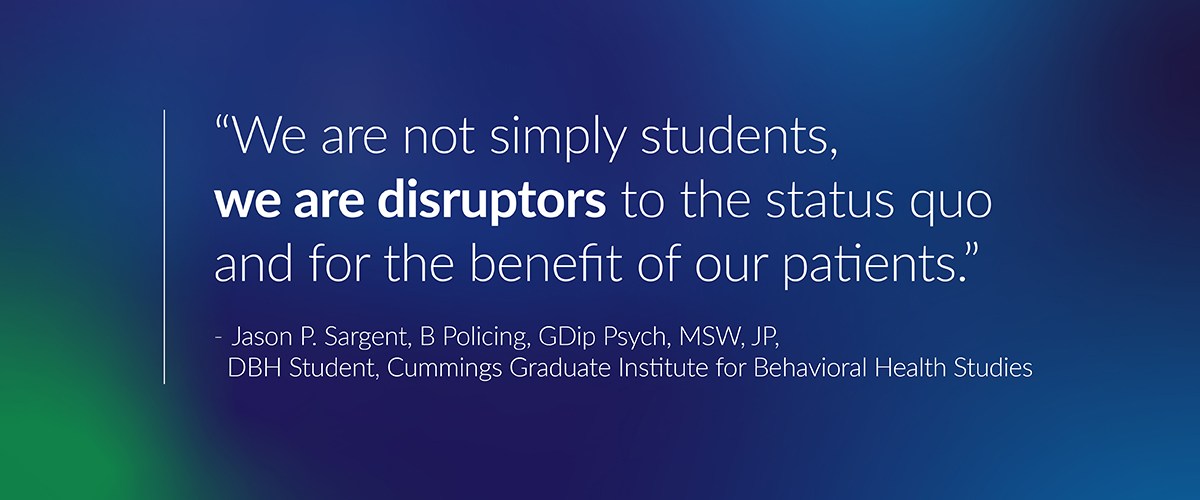 Jason P. Sargent is Shaping the Future of Police Mental Health in South Australia
Jason P. Sargent is Shaping the Future of Police Mental Health in South Australia
December 9, 2024
 Jason P. Sargent, B Policing, GDip Psych, MSW, JP, a Doctor of Behavioral Health (DBH) candidate at Cummings Graduate Institute (CGI), has taken his expertise and passion for mental health to the South Australian Select Committee on Police Mental Health. Jason’s testimony before the committee provided a powerful blend of professional insight, lived experience, and an urgent call for systemic reform.
Jason P. Sargent, B Policing, GDip Psych, MSW, JP, a Doctor of Behavioral Health (DBH) candidate at Cummings Graduate Institute (CGI), has taken his expertise and passion for mental health to the South Australian Select Committee on Police Mental Health. Jason’s testimony before the committee provided a powerful blend of professional insight, lived experience, and an urgent call for systemic reform.
Turning Experience into Advocacy
Jason’s path to this moment is deeply rooted in his own experiences. A former Australian Federal Police officer diagnosed with post-traumatic stress disorder (PTSD), he pivoted his career toward mental health services, determined to address the issues that affected him and so many others. Now a mental health clinician and director at Healthy Mind International PTY LTD, Jason has worked closely with South Australia Police (SAPOL) members, helping them navigate trauma and psychological challenges.
The South Australian Parliament publicly announced the inquiry into police mental health, calling for submissions from the public, and
“as a provider of mental health services to many South Australian Police members in the trauma space, and observing the failings of the South Australian Police that directly impacted my patients, I felt I had an obligation to my Police patients to advocate for change,”
Jason explained. He brought a clinician’s perspective to the inquiry, shedding light on the gaps in SAPOL’s mental health services.
Shining a Light on Systemic Challenges
During his testimony, Jason outlined the widespread mistrust in SAPOL’s internal Employee Assistance Programs (EAP), describing them as inadequate for addressing the complex mental health needs of officers. Many officers, he revealed, avoid these programs due to privacy concerns, fear of stigma, and a lack of trauma-informed care. Instead, they often seek private mental health services.
He highlighted alarming issues, including delays in post-incident care and breaches of confidentiality in medical records. Jason shared that he “had clients where their police medical records have had statements written in there of diagnoses that they have never been diagnosed with.” This erodes trust and forces officers to navigate an already challenging profession with diminished support.
The Advocacy’s Impact
Jason’s testimony received strong support from committee members, who acknowledged the clarity and depth of his insights. His presentation also resonated deeply with the officers he serves. With “many of the Police members I provide therapy to have expressed their thanks for my advocacy for them,” he shared. “I feel as a clinical professional I have had my professional voice heard in probably one of the most important legislative organizations in the State and that is a wonderful feeling.”
Beyond the gratitude of his patients, Jason views his role as a DBH candidate as integral to this accomplishment. “For me to be a DBH candidate it demonstrates to other DBH candidates that we are not simply students, we are disruptors to the status quo and for the benefit of our patients.”
Paving the Way for Systemic Reform
During this presentation Jason provided a both clear and actionable vision for the future of police mental health in South Australia. He recommended establishing external panels of trauma-informed clinicians to provide immediate, post-critical-incident debriefs and ongoing care. Drawing inspiration from international models, he also advocated for mandatory annual mental health assessments for all SAPOL employees. Through these measures, he believes, a significant reduction of stigma, improved officer retention, and a promotion of a healthier organizational culture can be achieved.
In his closing remarks, Jason expressed his hope that his testimony would serve as a catalyst for change.
“My hope is that South Australian Police are forced to admit their failings and implement sound mental health support policies for their police members. My overall hope is that my single voice may just be a catalyst for change in a world that still views mental health as something to ignore.”
CGI’s Impact in Empowering Change
Jason’s advocacy highlights the transformative impact of a CGI education. “Being empowered to be a disruptor, and having undertaken my DBH studies, meant I was well prepared to stand in front of Parliament members and not be intimidated,” he said. By equipping students to become leaders and innovators in behavioral health, CGI continues to influence critical conversations and advance the field globally.
As Jason Sargent awaits the committee’s recommendations, his efforts stand as a testament to the power of education, lived experience, and unwavering dedication to creating a better future for those who protect and serve.






























